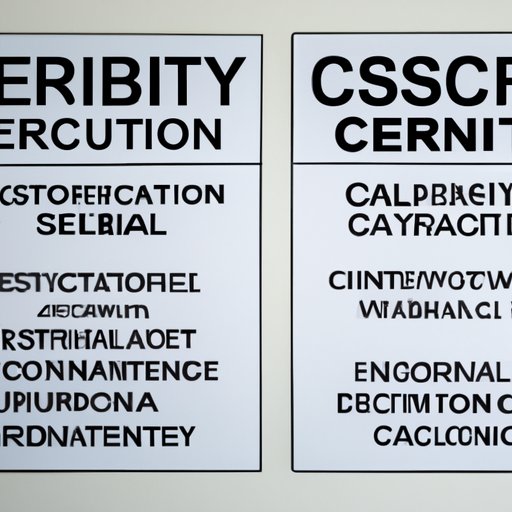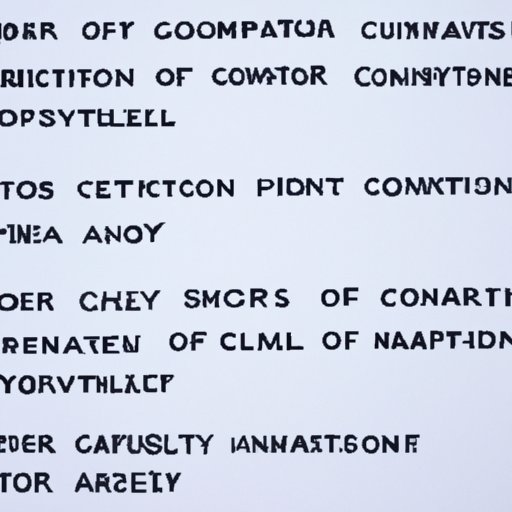Introduction
The world of cyber security is constantly evolving, and with it, so are the qualifications and certifications necessary to work in the industry. Cybersecurity certifications are an important way for professionals to demonstrate their knowledge and experience in the field, as well as their commitment to staying up-to-date on the latest trends and technologies. But which certification is best? This article will explore the different types of cybersecurity certifications available, their key differences, the opinions of experts, the job market, cost and time commitment, and the value and importance of having a certification.

Comparison and Contrast of Different Cybersecurity Certifications
When it comes to choosing the right certification, it’s important to understand the different types available and the key differences between them. Below is an overview of some of the most popular certifications.
Overview of Different Cybersecurity Certifications
- Certified Information Systems Security Professional (CISSP): CISSP is one of the most widely recognized certifications for security professionals. It is designed for those who have at least five years of experience in the field and covers topics such as risk management, asset security, cryptography, and security operations.
- CompTIA Security+: CompTIA Security+ is an entry-level certification that covers the fundamentals of network security, compliance, and operational security. It is ideal for IT professionals looking to gain a basic understanding of cybersecurity concepts.
- Certified Ethical Hacker (CEH): CEH is a more specialized certification that focuses on the tools and techniques used by hackers to exploit systems. It is aimed at those who want to learn how to identify, prevent, and respond to malicious attacks.
- Global Information Assurance Certification (GIAC): GIAC is another widely recognized certification that covers a broad range of topics related to information security, including system security, incident response, and digital forensics. It is suitable for experienced professionals or those just beginning their career.
Key Differences between Certifications
As you can see, there are a number of different certifications available, each with its own unique focus and level of difficulty. Some certifications, such as CISSP, require several years of experience before they can be obtained, while others, such as CompTIA Security+, are geared towards those just starting out in the field. Additionally, some certifications, such as CEH, are heavily focused on the technical aspects of security, while others, such as GIAC, cover a broader range of topics.
Interviewing Experts
To get a better understanding of which certification is best, we interviewed a number of experts in the field. We asked each of them the same set of questions about their qualifications, their opinions on which certification to choose, and their advice for those starting out in the cybersecurity field.
Qualifications of Experts
Our experts were highly qualified professionals with many years of experience in the field. They included certified ethical hackers, security engineers, and technology consultants. Each of them had multiple certifications and a deep understanding of the cybersecurity landscape.
Expert Opinions on Which Certification to Choose
When asked which certification they would recommend, the experts all agreed that it depends on the individual’s goals and experience level. For those just starting out, they recommended CompTIA Security+ or GIAC as a good place to begin. For those with more experience, they suggested either CISSP or CEH. Ultimately, they emphasized that it’s important to do your research and find the certification that best suits your needs.
Pros and Cons of Each Certification
In addition to the opinions of experts, it’s also important to consider the pros and cons of each certification. Below are the benefits and drawbacks of each.
Benefits of Each Certification
- CISSP: CISSP is a highly respected certification that is recognized around the world. It is a comprehensive program that covers a wide range of topics, making it an excellent choice for experienced professionals.
- CompTIA Security+: Security+ is an entry-level certification that is relatively easy to obtain. It provides a solid foundation of knowledge and is a great way to start a career in cybersecurity.
- CEH: CEH is the perfect choice for those interested in the technical aspects of security. It covers the tools and techniques used by hackers and provides a detailed understanding of security vulnerabilities.
- GIAC: GIAC is another widely recognized certification that covers a wide range of topics. It is suitable for both experienced professionals and those just starting out.
Drawbacks of Each Certification
- CISSP: CISSP requires a significant amount of experience and can be expensive to obtain. Additionally, it can take a long time to complete.
- CompTIA Security+: Security+ does not provide the same level of depth as other certifications and may not be enough to land a high-level position in the field.
- CEH: CEH is a specialized certification and may not be applicable to certain positions. Additionally, it is not as widely recognized as some other certifications.
- GIAC: GIAC is a comprehensive certification but may be too difficult for some people. It can also be expensive and time-consuming to obtain.
Job Market Analysis
In addition to the pros and cons of each certification, it’s also important to consider the job market. We analyzed the demand for different certifications and the effect on job prospects.
Demand for Different Certifications
Overall, we found that CISSP is the most in-demand certification, followed by Security+, CEH, and GIAC. However, this varies depending on the region and the type of job. For example, Security+ is more popular in North America than in Europe, while CEH is more sought-after in Asia. Additionally, some jobs may require specific certifications, such as CEH for penetration testers or GIAC for forensic analysts.
Effect on Job Prospects
Having a certification can definitely improve your job prospects. Employers are often looking for candidates with specific certifications, and having one can give you a competitive edge over other applicants. Additionally, certifications can help you stand out from the crowd and show potential employers that you are serious about your career.
Cost and Time Commitment
It’s also important to consider the cost and time commitment involved in obtaining a certification. Below is a breakdown of the cost and length of each certification.
Cost of Obtaining Certification
- CISSP: $699 (plus exam fee)
- CompTIA Security+: $349 (plus exam fee)
- CEH: $1,999 (plus exam fee)
- GIAC: $1,999 (plus exam fee)
Length of Certification
- CISSP: 6 months – 1 year
- CompTIA Security+: 3 – 6 months
- CEH: 3 – 6 months
- GIAC: 6 – 12 months

Value and Importance of Cybersecurity Certifications
In addition to the cost and time commitment, it’s also important to consider the value and importance of having a certification. Below are some of the benefits of having a certification.
Benefits of Having a Certification
- Demonstrates your knowledge and experience in the field
- Improves your chances of getting hired or promoted
- Provides a competitive edge over other applicants
- Increases your earning potential
- Gives you access to exclusive resources and services
Reasons to Pursue a Certification
Ultimately, the decision of whether or not to pursue a certification is a personal one. However, there are a few key reasons why it might be beneficial for you. First, it can help demonstrate your knowledge and experience in the field. Second, it can improve your chances of getting hired or promoted. Third, it can increase your earning potential. And lastly, it can give you access to exclusive resources and services.
Conclusion
In conclusion, there are a number of different cybersecurity certifications available, each with its own unique focus and level of difficulty. It’s important to do your research and find the certification that best suits your needs. Additionally, it’s important to consider the cost and time commitment involved, as well as the value and importance of having a certification. Ultimately, the decision of whether or not to pursue a certification is a personal one, but it can certainly be beneficial for your career.
(Note: Is this article not meeting your expectations? Do you have knowledge or insights to share? Unlock new opportunities and expand your reach by joining our authors team. Click Registration to join us and share your expertise with our readers.)
